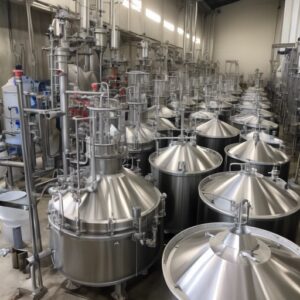In the intricate web of modern industry, efficiency is paramount. Every step of the production process must be finely tuned to ensure optimal results. Amidst this complexity, toll blending emerges as a crucial element, often hidden but indispensable. This article delves into the significance of toll blenders, exploring what they are, how they operate, and why they are essential in today’s manufacturing landscape.
What is Toll Blending?
Toll blending, also known as contract blending or custom mixing, is a specialized service offered by companies to mix, blend, or formulate materials on behalf of clients. These materials can range from powders to liquids, chemicals to food ingredients. The process typically involves precise measurements and mixing techniques to achieve the desired product specifications.
The Role of Toll Blenders
Toll blenders serve as intermediaries between raw material suppliers and end-users. They bridge the gap between ingredient procurement and product manufacturing, offering expertise and resources to streamline production processes. By outsourcing blending tasks to specialized facilities, companies can focus on their core competencies while benefiting from the specialized knowledge and equipment of toll blenders.
Key Functions of Toll Blenders
Custom Formulation: Toll blenders work closely with clients to develop custom formulations tailored to specific product requirements. Whether it’s adjusting ingredient ratios, refining particle sizes, or enhancing product properties, toll blenders employ their expertise to achieve desired outcomes.
Quality Assurance: Quality control is paramount in manufacturing. Toll blenders adhere to strict quality standards throughout the blending process, conducting thorough testing and analysis to ensure consistency and compliance with regulatory requirements.
Flexibility: One of the primary advantages of toll blending is its flexibility. Companies can scale production volumes according to demand without investing in additional equipment or infrastructure. This scalability allows for cost-effective production and rapid response to market fluctuations.
Specialized Equipment: Toll blenders invest in state-of-the-art equipment and technology to optimize blending processes. From high-speed mixers to precision measuring instruments, these facilities are equipped to handle a wide range of blending requirements efficiently and accurately.
Logistics Management: Managing logistics is a complex aspect of manufacturing. Toll blenders streamline the supply chain by coordinating material sourcing, transportation, and delivery, ensuring seamless integration into the production workflow.
Industries Utilizing Toll Blending
Toll blending finds applications across various industries, including:
Chemicals: Toll blenders formulate specialty chemicals used in coatings, adhesives, and other industrial applications.
Food and Beverage: From spice blends to nutritional supplements, toll blenders play a crucial role in food and beverage manufacturing.
Pharmaceuticals: Pharmaceutical companies rely on toll blenders to mix active ingredients and excipients for drug formulations.
Personal Care: Cosmetics, toiletries, and skincare products often require custom blending of ingredients to achieve desired textures and properties.
Why Toll Blending Matters
Cost Efficiency: Outsourcing blending tasks to toll blenders can result in significant cost savings. By avoiding capital investment in equipment and manpower, companies can allocate resources more effectively, improving overall profitability.
Time Savings: Time is of the essence in manufacturing. Toll blenders expedite the blending process, reducing lead times and accelerating time-to-market for products.
Expertise and Innovation: Toll blenders bring specialized knowledge and expertise to the table, driving innovation in product development and formulation. Their insights into material properties and blending techniques can lead to breakthroughs in product performance and functionality.
Risk Mitigation: Partnering with toll blenders can mitigate risks associated with production variability, regulatory compliance, and quality control. These facilities are equipped to handle stringent quality standards and regulatory requirements, minimizing potential liabilities for clients.
Conclusion
In the intricate tapestry of modern manufacturing, a toll blender emerges as a vital thread, weaving together raw materials and production processes with precision and efficiency. By leveraging the expertise and resources of toll blenders, companies can navigate the complexities of product formulation and manufacturing with confidence, unlocking new possibilities for innovation and growth. As industries evolve and demands shift, the role of toll blenders will continue to be indispensable, driving progress and prosperity in the global marketplace.


